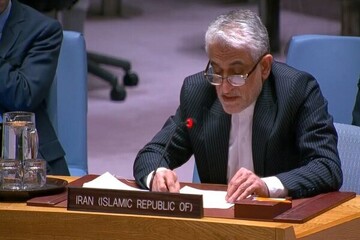-
 2026-01-06 22:09
2026-01-06 22:09
By Soheila Zarfam
What would an 'unconfined' Iranian response look like?
Defence Council’s statement suggests Iran wants to make any new US-Israeli aggression their last
TEHRAN – For several years, Iranian political and military leaders have been known for practicing "strategic patience"—a policy of avoiding impulsive responses and refusing to be the party that escalates tensions. This has largely remained Tehran’s approach over the last two years too, even as Israel has set the region ablaze, crossing new red lines daily in an attempt to drag Iran and its allies into a full-scale war with the United States.
-

By Parviz Jamshidi
Should Europe tremble as Trump keeps threatening to grab Greenland?
TEHRAN - Donald Trump is causing fear among Europeans by repeatedly threatening that the U.S. is seeking to annex Greenland, a semi-autonomous region of fellow NATO member Denmark, by force if necessary.
-

By Mona Hojat Ansari
Baghaei tells Tehran Times ‘relations with Lebanon matter greatly’ ahead of FM’s visit
Spox says new Lebanese and Iranian ambassadors will begin missions soon
TEHRAN – Iran’s Foreign Ministry Spokesman Esmaeil Baghaei recently visited the Tehran Times, where he met with the newspaper’s Editor-in-Chief and CEO and gave a detailed interview to a correspondent.
-

By Sondoss Al Asaad
Lebanon’s governance in crisis
Lebanon’s political system is so hollowed out that even a fictitious foreign prince can dictate governance
BEIRUT—Imagine a country where a fictitious foreign prince, armed only with a phone and a fabricated authority, can dictate political appointments, unlock frozen bank accounts, and influence judicial decisions—all without leaving his home.
-

By staff writer
Israel’s expansionist agenda: Aggression in Syria amid Paris talks
TEHRAN – The persistence of Israeli military aggression in southern Syria, reported on Tuesday even as negotiations were underway in Paris, illustrates the contradiction between declared diplomatic efforts and the reality of the regime’s expansionist policies.
-

By Wesam Bahrani
Catastrophic year for Palestinians in 2025
TEHRAN – An official Palestinian report has documented the catastrophic suffering of Palestinians in 2025 at the hands of the Israeli occupation regime.
Politics
-

Iran decries US 'rogue state' actions in Venezuela and against itself
TEHRAN – Addressing an emergency session of the United Nations Security Council on Monday, Iran’s Ambassador to the UN, Amir Saeed Iravani, condemned the United States for its military attack on Venezuela and the kidnapping of the nation's democratically elected President and First Lady.
-

Tehran rallies Latin American allies after US ‘law of jungle’ act in Venezuela
TEHRAN – Iranian Foreign Minister Abbas Araghchi held separate phone calls with his counterparts from Brazil and Cuba, with the recent U.S. military aggression in Venezuela dominating the discussions.
-

The West’s nuclear renaissance and the denial of others’ rights
The Trump administration’s renewed focus on reviving the U.S. nuclear industry has once again exposed the deep contradiction between the West’s official narrative of “clean and sustainable energy” and its political treatment of independent countries—a contradiction in which nuclear energy is deemed legitimate for some and criminal for others.
Sports
-

Iran U23 show structure and discipline against Korea Republic
TEHRAN - Iran’s U23 national team opened their AFC U23 Asian Cup campaign with a goalless draw against Korea Republic, a result that revealed more about the team’s tactical identity and developmental direction than the scoreline itself.
-

Korea Republic, Iran settle for draw in AFC U23 Asian Cup 2026
TEHRAN - Korea Republic and Iran settled for a goalless draw in their AFC U23 Asian Cup Saudi Arabia 2026 opening Group C match on Wednesday.
-

Iranians honor 58th anniversary of Takhti’s death
TEHRAN - Iranians on Wednesday marked the 58th anniversary of the death of legendary wrestler Gholamreza Takhti, a national icon whose legacy extends far beyond sport.
Culture
-

First International Cartoon and Poster Contest “Terror Online” concludes in Tehran
TEHRAN – The closing ceremony of the first International Cartoon and Poster Contest “Terror Online” was held on the evening of January 5 at the Art Bureau in Tehran.
-

Veteran actor Saeed Pirdoost passes away at 85
TEHRAN — Renowned cinema and television actor Saeed Pirdoost passed away on Tuesday morning at his home in Tehran, on his 85th birthday, after a battle with cancer.
-

Braille toys to be unveiled in National Toy Festival
TEHRAN- Iran Association of Toys is set to unveil the country's first Braille toys in the framework of the 10th National Toys Festival, which is currently underway in Tehran.
Economy
-

Road transit through Iran’s land borders reaches 12.5m tons in 9 months
TEHRAN – Road transit of goods through Iran’s land borders reached about 12.5 million tons in the first nine months of the current Iranian calendar year (March 21-Decemebr 21, 2025), reflecting continued growth in overland trade flows across the country, a senior transport official said.
-

Iran petrochemicals exhibit opens in Kish with exports topping $10b
TEHRAN – Iran’s third petrochemical industry exhibition opened on Kish Island on Tuesday, bringing together more than 200 domestic companies amid renewed focus on technology, investment and export growth in one of the country’s main hard-currency earning sectors.
-

NIDC completes drilling of 101 oil, gas wells since late Mar. 2025
TEHRAN –National Iranian Drilling Company (NIDC) has completed 101 oil and gas wells so far this year (started in late March 2025), with total drilling footage reaching 103,456 meters, the company’s head said.
Society
-

DOE approves seven community conserved areas
TEHRAN – In an effort to strengthen the participation of local communities in conserving nature, the Department of Environment (DOE) has approved seven natural areas to be protected by the public.
-

Workshop held to enhance national capacity for drug use disorder treatment
TEHRAN – The United Nations Office on Drugs and Crime (UNODC), in close collaboration with the Iranian Drug Control Headquarters (DCHQ) and the Ministry of Health and Medical Education (MoHME), has held a training workshop aimed at enhancing the competencies of drug use disorder treatment professionals through the systematic application of the UNODC TreatNet Training Package.
-

Health ministry, UNICEF join hands to activate Child Protection Committees in hospitals
TEHRAN – To ensure that medical settings serve as a strong shield for children at risk, the United Nations Children’s Fund, in cooperation with the Ministry of Health and Medical Education, has organized an event to strengthen integrated child protection services as the first step toward activating Child Protection Committees within hospitals.
Tourism
-

Sarakhieh, Iran’s little Venice
At first, it is hard to believe such a place exists in Iran. But deep inside the vast Shadegan wetland in Khuzestan province, there is a village where water is the main road and boats replace cars. This village is Sarakhieh, often called Iran’s “Little Venice.”
-

Sa’dabad Complex’s historical documents rescanned and recatalogued
TEHRAN - Historical documents held at Tehran’s Sa’dabad Cultural-Historical Complex have been recatalogued and rescanned in recent months following a years-long pause, a museum official said.
-

Iran to participate in FITUR, EMITT 2026
TEHRAN--Iran is to participate in FITUR (the International Tourism Trade Fair) in Spain and EMITT 2026 in Turkey during current year.
International
-

Lebanon’s governance in crisis
BEIRUT—Imagine a country where a fictitious foreign prince, armed only with a phone and a fabricated authority, can dictate political appointments, unlock frozen bank accounts, and influence judicial decisions—all without leaving his home.
-

Israel’s expansionist agenda: Aggression in Syria amid Paris talks
TEHRAN – The persistence of Israeli military aggression in southern Syria, reported on Tuesday even as negotiations were underway in Paris, illustrates the contradiction between declared diplomatic efforts and the reality of the regime’s expansionist policies.
-

Catastrophic year for Palestinians in 2025
TEHRAN – An official Palestinian report has documented the catastrophic suffering of Palestinians in 2025 at the hands of the Israeli occupation regime.
Most Viewed
-
Miscalculation by Iran's enemies could open gates of hell on them
-
What would an 'unconfined' Iranian response look like?
-
15240
-
Iran and AsiaEuro continent: Underestimated connection and underrecognized role
-
Iran moves towards single forex rate, aims to unify forex markets amid economic concerns
-
The anarchy of the Trump Doctrine
-
Sarakhieh, Iran’s little Venice
-
Administered states, contained fortresses, legal relics
-
Lebanon between war and ‘neutralization’
-
Lebanon’s governance in crisis
-
From ally to aggressor: Greenland exposes Europe’s security illusion
-
Tehran warns of global fallout over US abduction of Venezuelan president
-
Trump’s imperial reach: From Latin America to Greenland
-
Baghaei tells Tehran Times ‘relations with Lebanon matter greatly’ ahead of FM’s visit
-
Trump's Iran meddling from sanctions to tweets












